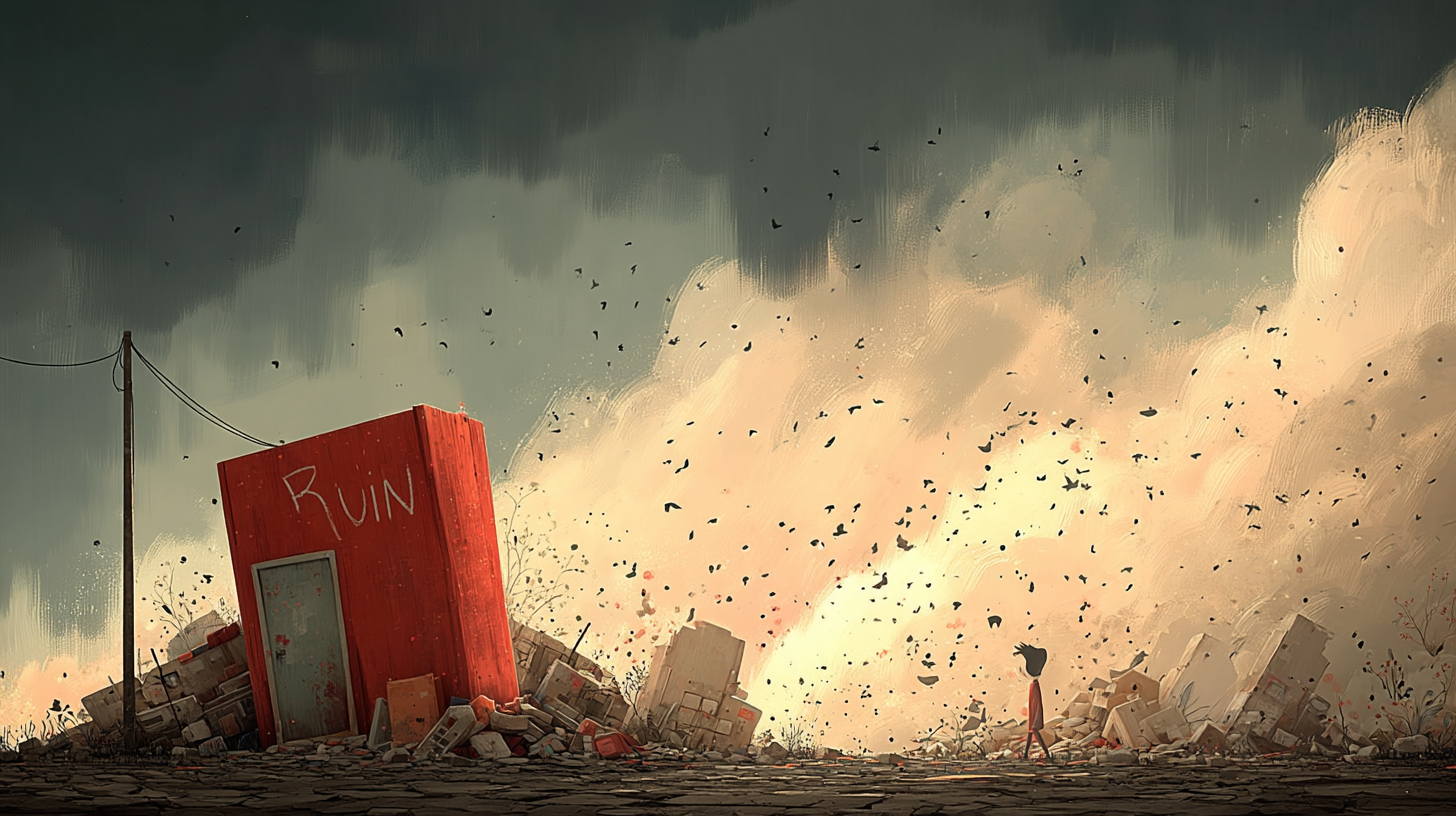“Ruin” means to break or destroy something, or the broken thing itself like an old building.
「ruin」は、「こわす」や「めちゃくちゃにする」こと、または「こわれたもの(廃墟など)」のことをいいます。
以下は英単語 “ruin” に関するストーリー型学習コンテンツです。まずは大枠の意味を理解して最後の文章で確認しましょう。
主な意味(main meaning)
| 品詞 | 意味(簡潔) | 発音記号 | 英語例文 |
|---|---|---|---|
| 動詞 (verb) | 壊す、台無しにする | /ˈruːɪn/ | Heavy rain ruined our picnic. |
| 名詞 (noun) | 廃墟、破滅、衰退 | /ˈruːɪn/ | The castle is now in ruins. |
語源(etymology)
「ruin」はラテン語の「ruina(崩壊、倒壊)」が語源で、「崩れる・倒れる」というイメージを持っています。
類義語(synonyms)
| 類義語 | 英語例文 |
|---|---|
| destroy | The fire destroyed the entire house. |
| wreck | The storm wrecked the boat. |
| damage | Smoking can damage your lungs. |
| collapse | The building collapsed during the earthquake. |
| devastate | The war devastated the country. |
反義語(antonyms)
| 反義語 | 英語例文 |
|---|---|
| restore | They restored the old painting beautifully. |
| build | We plan to build a new school next year. |
コロケーション(collocations)
| コロケーション | 英語例文 |
|---|---|
| fall into ruin | The old mansion fell into ruin after years of neglect. |
| cause ruin | His lies caused the ruin of their friendship. |
| be in ruins | The ancient city was in ruins. |
| ruin a relationship | Jealousy can ruin a relationship. |
| economic ruin | The company faced economic ruin during the crisis. |
2項表現(binomials)
| 2項表現 | 英語例文 |
|---|---|
| rise and fall | The rise and fall of the empire were dramatic. |
| hopes and ruins | His dreams ended in hopes and ruins. |
英語ストーリー(english story)
Title: The Unexpected Trip
Samantha was planning a weekend picnic with her friends. She had been looking forward to it all week. On Saturday morning, the sky looked dark, but she hoped the weather would improve. Unfortunately, heavy rain began to fall just as they arrived at the park. The strong wind broke their tent, and the food got soaked. The storm ruined (ruin) everything.
Later, they visited an old castle nearby. It had fallen into ruin (ruin) many years ago, but it still looked beautiful. A guide explained the rise and fall (binomial) of the castle’s history. He said it had been destroyed (destroy) in a war.
Despite the ruined picnic, they enjoyed learning about the past. Samantha realized that sometimes even ruined (ruin) plans can lead to new adventures.
和訳
題名:思いがけない旅行
サマンサは週末に友だちとピクニックを計画していました。彼女はその日をずっと楽しみにしていました。土曜日の朝、空は暗く、彼女は天気がよくなることを願っていました。しかし、彼らが公園に着いたとたん、激しい雨が降り始めました。強い風でテントが壊れ、食べ物はびしょ濡れになりました。嵐はすべてを台無しにしました(ruined)。
その後、彼らは近くの古いお城を訪れました。そのお城は何年も前に**廃墟(ruin)となっていましたが、今でも美しく見えました。ガイドはそのお城の盛衰(rise and fall)の歴史を話してくれました。彼は、それが戦争で壊された(destroyed)**と説明しました。
ピクニックは**台無し(ruined)**になってしまいましたが、彼らは過去について学ぶのを楽しみました。サマンサは、時には予定が崩れても、新しい冒険につながることがあると気づきました。
Q&A
Q: 「ruin」と「destroy」はどう違いますか?
A: 「destroy」は完全に壊してなくしてしまう意味で、「ruin」より強いです。「ruin」は「元に戻せないくらい悪くする」や「台無しにする」という意味で、物理的に壊す以外にも、気持ちや関係、人の人生など抽象的なものにもよく使います。
Q: 「ruin」と「wreck」の違いは何ですか?
A: 「wreck」は主に乗り物(車、船、飛行機など)や建物を「ひどく壊す」ときに使います。具体的なものに対してのダメージに使うことが多いです。「ruin」はもっと広く使えて、たとえば「計画」「関係」「人生」など抽象的なものも含まれます。
Q: 「ruin」と「damage」の違いは?
A: 「damage」は「部分的なダメージ」を意味し、「少し壊れた」や「傷ついた」場合にも使います。「ruin」は「完全にダメにしてしまう」や「取り返しがつかないほど損なう」ニュアンスです。つまり、「damage」は軽い損傷にも使えますが、「ruin」はもっと深刻です。
Q: 「ruin」と「collapse」の違いは?
A: 「collapse」は「崩れる」「倒れる」といった意味で、建物や組織、人が物理的または比喩的に「力を失って崩れる」イメージです。「ruin」は崩壊の結果として「使い物にならなくなった状態」も含む広い意味です。
Q: 「ruin」と「devastate」の違いは?
A: 「devastate」は「徹底的に破壊する」という意味で、「ruin」よりもさらに感情的・強烈な印象があります。特に災害や戦争によって「地域全体を壊す」ようなときに使われます。また、心が「打ちのめされる」意味でも使われます(例:She was devastated by the news.)。
Q: 「ruin a relationship」と「damage a relationship」の違いは?
A: 「ruin a relationship」は関係が完全に壊れてしまった場合(もう戻れない)に使います。「damage a relationship」はまだ修復の余地がある場合(問題が起きたが、回復できるかもしれない)に使われます。
Q: 「economic ruin」と「economic collapse」の違いは?
A: 「economic ruin」は「経済的破滅」で、個人や会社がもう再起できないほど貧しくなる場合にも使われます。「economic collapse」は「経済の崩壊」で、国や大きな組織が突然システムとして崩れることを指します。



コメント